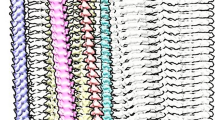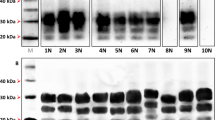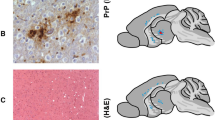Abstract
THE nature of the aetiological agent of scrapie disease, a transmissible encephalopathy naturally affecting sheep and goats, remains a perplexing problem of fundamental biological importance. Recent studies on brain tissue from outbred Syrian hamsters infected with a strain originating from the Chandler strain of mouse-adapted scrapie have led to a report of a DNA component essential for scrapie infectivity as suggested by sensitivity to DNase1. The data presented here describe a purification procedure resulting in scrapie infectivity which migrates during polyacrylamide gel electrophoresis as a defined area of infectivity in a region characteristic of low molecular weight nucleic acid. This electrophoretically migrating species of the scrapie agent retains the characteristic disease properties by intercerebral inoculation of crude hamster brain homogenates. Infectivity isolated from this region was resistant to treatment with a combination of SDS and proteinase K followed by ethanol precipitation. These data support the suggestion that the scrapie agent may be an infectious low molecular weight DNA.
This is a preview of subscription content, access via your institution
Access options
Subscribe to this journal
Receive 51 print issues and online access
$199.00 per year
only $3.90 per issue
Buy this article
- Purchase on Springer Link
- Instant access to full article PDF
Prices may be subject to local taxes which are calculated during checkout
Similar content being viewed by others
References
Marsh, R. F., Malone, T. G., Semancik, J. S., Lancaster, W. D. & Hanson, R. P. Nature 275, 146–147 (1978).
Malone, T. G., Marsh, R. F., Hanson, R. P. & Semancik, J. S. J. Virol. 25, 933–935 (1978).
Millson, G. C., Hunter, G. D. & Kimberlin, R. H. in Slow Virus Diseases of Animals and Man (ed. Kimberlin, R. H.) (North-Holland, Amsterdam, 1976).
Marsh, R. F., Malone, T. G., Lancaster, W. D., Hanson, R. P. & Semancik, J. S. in Persistent Viruses Vol. II (eds Stevens, J. C., Todaro, G. J. & Fox, C. F.) (Academic, New York, 1978).
Bishop, D. H. L., Claybrook, J. R. & Spiegelman, S. J. molec. Biol 26 373–387 (1967).
Alper, T., Haig, D. A. & Clarke, M. C. Biochem. biophys. Res. Commun. 22, 278–284 (1966).
Field, E. J., Farmer, F., Caspary, E. A. & Joyce, G. Nature 222, 90–91 (1969).
Adams, D. H. J. Neurochem 19, 1869–1882 (1972).
Diener, T. O. Nature 235, 218–219 (1972).
Semancik, J. S., Morris, T. J., Weathers, L. G., Rodorf, B. F. & Kearns, D. R. Virology 63, 160–167 (1975).
Marsh, R. F., Semancik, J. S., Medappa, K. C., Hanson, R. P. & Rueckert, R. R. J. Virol. 13, 993–996 (1974).
Gross-Bellard, M., Oudet, P. & Chambon, P. Eur. J. Biochem. 36, 32–38 (1973).
Sharp, P. A., Moore, C. & Haverty, J. L. Virology 75, 442–456 (1976).
Author information
Authors and Affiliations
Rights and permissions
About this article
Cite this article
MALONE, T., SEMANCIK, J., MARSH, R. et al. Evidence for the low molecular weight nature of scrapie agent. Nature 278, 575–576 (1979). https://doi.org/10.1038/278575a0
Received:
Accepted:
Issue Date:
DOI: https://doi.org/10.1038/278575a0
This article is cited by
-
Molecular hybridization studies with scrapie brain nucleic acids
Archives of Virology (1986)
-
Scrapie infectious agent is virus-like in size and susceptibility to inactivation
Nature (1984)
Comments
By submitting a comment you agree to abide by our Terms and Community Guidelines. If you find something abusive or that does not comply with our terms or guidelines please flag it as inappropriate.



